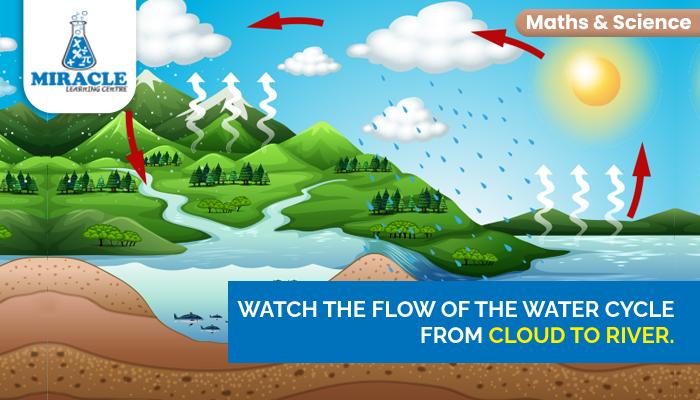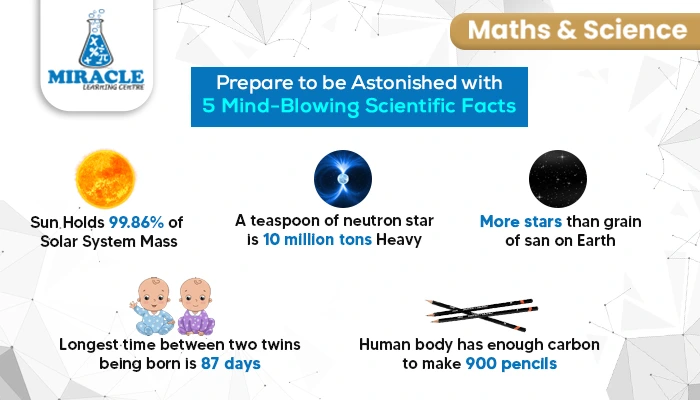Water is the lifeblood of our planet. It sustains all living organisms, shapes our landscapes, and even plays a crucial role in regulating our climate. But have you ever wondered how water moves through the environment, constantly cycling between the atmosphere, land, and oceans? The answer lies in the remarkable and essential process known as the water cycle. We at Miracle Learning Centre, a leading Science Tuition Centre in Singapore, believe that understanding the water cycle is fundamental to environmental literacy. Our science tuition centre in Singapore offers comprehensive lessons that unravel the mysteries of this miraculous natural process. Come along with us as we embark on a journey towards the water cycle to ensure a better, more sustainable future.
What is the Water Cycle?
The water cycle, also known as the hydrological cycle, is a continuous and dynamic process that describes how water circulates and recycles through the Earth’s various reservoirs. These reservoirs include the atmosphere, oceans, lakes, rivers, glaciers, and groundwater. It’s a beautiful example of nature’s efficient recycling system, ensuring that every drop of water gets used and reused.
The Six Key Stages of the Water Cycle
The water cycle comprises six main stages, each contributing to the movement and transformation of water. Let’s explore these stages in detail:
Evaporation:
The cycle begins when the sun’s radiant energy heats the Earth’s surface, causing water in oceans, rivers, lakes, and other bodies of water to evaporate and transform into water vapor. This process is the first step in the journey of water through the atmosphere.
Condensation:
As water vapor rises into the atmosphere, it cools and condenses to form tiny water droplets. These droplets come together to create clouds, which can be seen as visible evidence of this stage in the water cycle.
Precipitation:
When cloud droplets grow heavy enough, gravity pulls them down to the Earth’s surface as precipitation. Precipitation can take various forms, including rain, snow, sleet, and hail, depending on factors such as temperature and altitude.
Surface Runoff:
After falling to the ground, precipitation flows across the Earth’s surface, forming streams, rivers, and eventually reaching larger bodies of water like lakes and oceans. Some precipitation also infiltrates the ground and becomes groundwater.
Groundwater:
Water that infiltrates the soil can be stored in underground aquifers, becoming groundwater. It can remain there for extended periods or resurface through natural springs or human-made wells.
Transpiration:
Plants play a crucial role in the water cycle through a process called transpiration. They absorb water from the soil through their roots and release it into the atmosphere through small openings in their leaves. This water vapor also contributes to the formation of clouds.
The Importance of the Water Cycle
The water cycle is vital for several reasons, making it one of the most important natural processes on Earth:
Ensuring a Freshwater Supply: The water cycle continuously replenishes freshwater sources, ensuring a reliable supply for drinking, agriculture, and industry.
Regulating Climate: The movement of water in the atmosphere helps regulate the Earth’s temperature and climate. It transports heat from the equator to the poles, influencing weather patterns.
Supporting Ecosystems: All forms of life depend on water, and the water cycle sustains ecosystems by providing the moisture needed for plant growth and maintaining habitats for countless species.
Natural Purification: As water travels through the water cycle, it undergoes natural purification processes, removing impurities and pollutants along the way.
Shaping Landscapes: Erosion, sediment transport, and deposition of materials by water have a profound impact on shaping the Earth’s surface, creating features like valleys, deltas, and canyons.
Human Impact on the Water Cycle
While the water cycle is a natural process, human activities have the potential to disrupt it. Pollution, deforestation, urbanization, and excessive groundwater extraction can alter the balance of the water cycle. Climate change, driven by the release of greenhouse gases, can also influence the timing and intensity of precipitation, leading to more frequent and severe droughts and floods.
It’s essential for us to recognize our role in preserving the integrity of the water cycle. Sustainable water management practices, responsible land use, and efforts to reduce greenhouse gas emissions are crucial steps to protect this vital process and ensure a sustainable water supply for future generations.
Science Tuition: Enhancing Understanding of the Water Cycle
Science tuition plays a crucial role in simplifying complex concepts, making subjects like the water cycle more accessible to students. At Miracle Learning Centre, a renowned Science Tuition Centre in Singapore, we understand the significance of providing a supportive and enriching learning environment. Our experienced tutors are dedicated to demystifying the intricacies of the water cycle, using engaging teaching methods and real-world examples.
Our Science Tuition program in Singapore offers a unique platform for students to delve deep into the world of the water cycle. Through interactive lessons, hands-on experiments, and comprehensive study materials, we equip students with the knowledge and skills to comprehend this natural phenomenon. Our tutors go the extra mile to ensure that students not only grasp the fundamentals but also appreciate the beauty and importance of the water cycle.
Conclusion
The water cycle is a magnificent and intricate natural system that ensures the continuous circulation and availability of water on our planet. It sustains life, shapes landscapes, and maintains the delicate balance of our environment. Understanding the water cycle is not only a fascinating glimpse into the inner workings of nature but also a reminder of our responsibility to protect and preserve this essential process for the well-being of all living creatures on Earth. So, if you’re interested in delving deeper into this fascinating topic, why wait? Join our science tuition centre in Singapore and embark on a journey of discovery with us.


